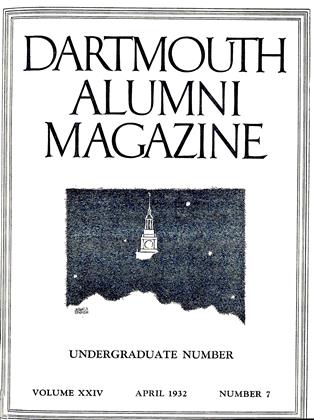Spring has followed winter and winter has followed spring with that certainty peculiar to Hanover alone in these months. Spring fever is practically a non-existent condition so far. It hasn't had a chance to get started. A week of warm days, a week when one could sit on the front steps of Dartmouth Hall and bask in the warm sunlight for that restful few minutes before class, a week when Velvet Rocks and the soft side of Balch Hill claimed any number of indolents—this was followed by a week of severest cold. Of course, we recall how it snowed furiously in the middle of April last year, but April hadn't held forth the promises which this year has. The comforting sight of a bog around Commons and the taxi stand, and the daily increasing torrents and bogs across the campus had begun to lighten our hearts when we wakened one morning to find that a vigorous frost had made mountains of the marshes and skating rinks of the rivers. We must confess that we're sorry to bring forth the subject of galoshes again, but we do it only to report that the trend seems away from them now. Moccasins, though we don't know why, have come to supplant them. And we must add here the very superficial observation that Hanover's undressedness, as a visiting damsel snootily expressed it last week-end, is entirely the result and duplication of Hanover's weather. It would be annoying no end to try and follow this analogy through—if my audience will only trouble to remember its own transitions from oxfords to ski-boots, from sweaters to ski-jackets and back again. Besides, who is there to see? And if there is anyone to see, who is there to care?
Another thing which continuously from freshman year has amazed us is the low mortality rate from falling snow during the winter months. The slightest thaw is always sufficient to send great cataracts of accumulated snow and ice catapulting from the roofs of dormitories and fraternity houses, yet we've never seen or heard of anyone who has had the ill fortune to be standing in the path of such a downfall. Having surveyed the situation with the careful research known to this department and the Jacko alone, we have reached the conclusion that its worst effect is in the fraying of the nerves which it produces as it starts ripping and tearing down the roof of the Gymnasium as we sweat and curse under the strain of mid-year examinations, to sigh through the air and splash with a thud next to Sid Hazelton's Emporium for Those Who Would Swim. Personally, we have gotten many C's which should have been B's, and so on down the line all because of this—which, you will grant, is at least something original in the way of an alibi.
THE 1932 SENIOR MT. WASHINGTON TRIP AT THEIR BASE AT PINKHAM NOTCH Left to Right: J. B. Keller, R. B. Marsh, R. Coltman, W. G. Raoul '33, C. D. Doerr, A. E. Allen, R. H. Manville, A. E. Rice, J. A. Wright, W. C. Brister, E. B. Jump, J. R. Boldt Jr., E. B. Marks Jr., C. L. Knight, E. F. Carter, M. L. Hobart, C. H. Owsley, Bob Monahan '29, Joe Dodge—Hutmaster at Pinkham Notch, J. M. Clark
 View Full Issue
View Full Issue
More From This Issue
-
 Article
ArticleAn Undergraduate Looks at His College
April 1932 By Howland H. Sargeant '32 -
 Article
Article"Wildcatter"—A Play in One Act
April 1932 By James W. Riley '32 -
 Class Notes
Class NotesCLASS OF 1910
April 1932 By Harold P. Hinman -
 Class Notes
Class NotesCLASS OF 1928
April 1932 By Leroy C. Milliken -
 Class Notes
Class NotesCLASS OF 1926
April 1932 By J. Branton Wallace -
 Article
ArticleThe Value of Fraternities to the College
April 1932 By Robert Coltman '32







